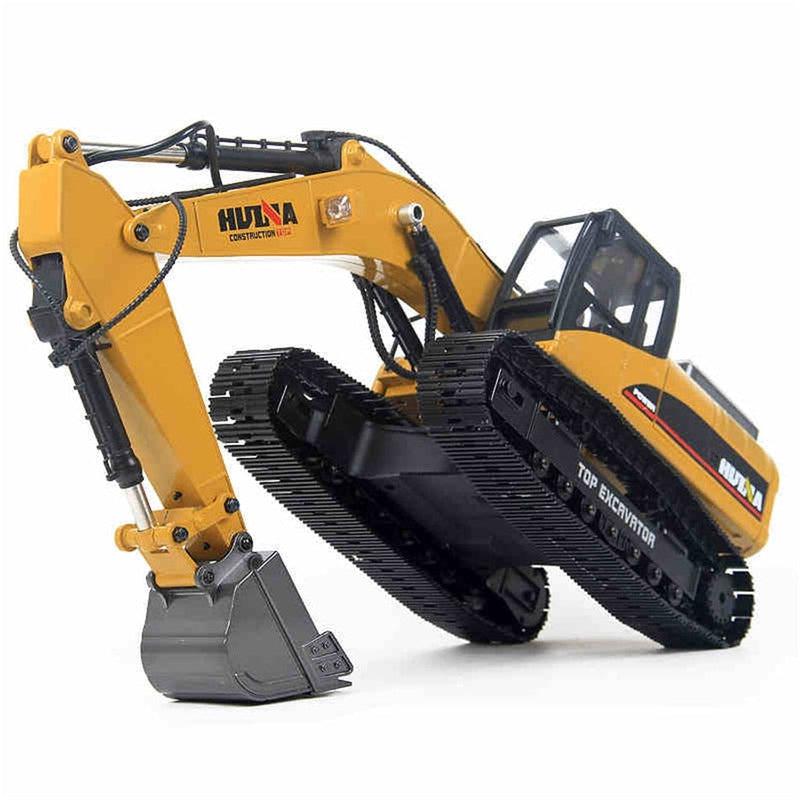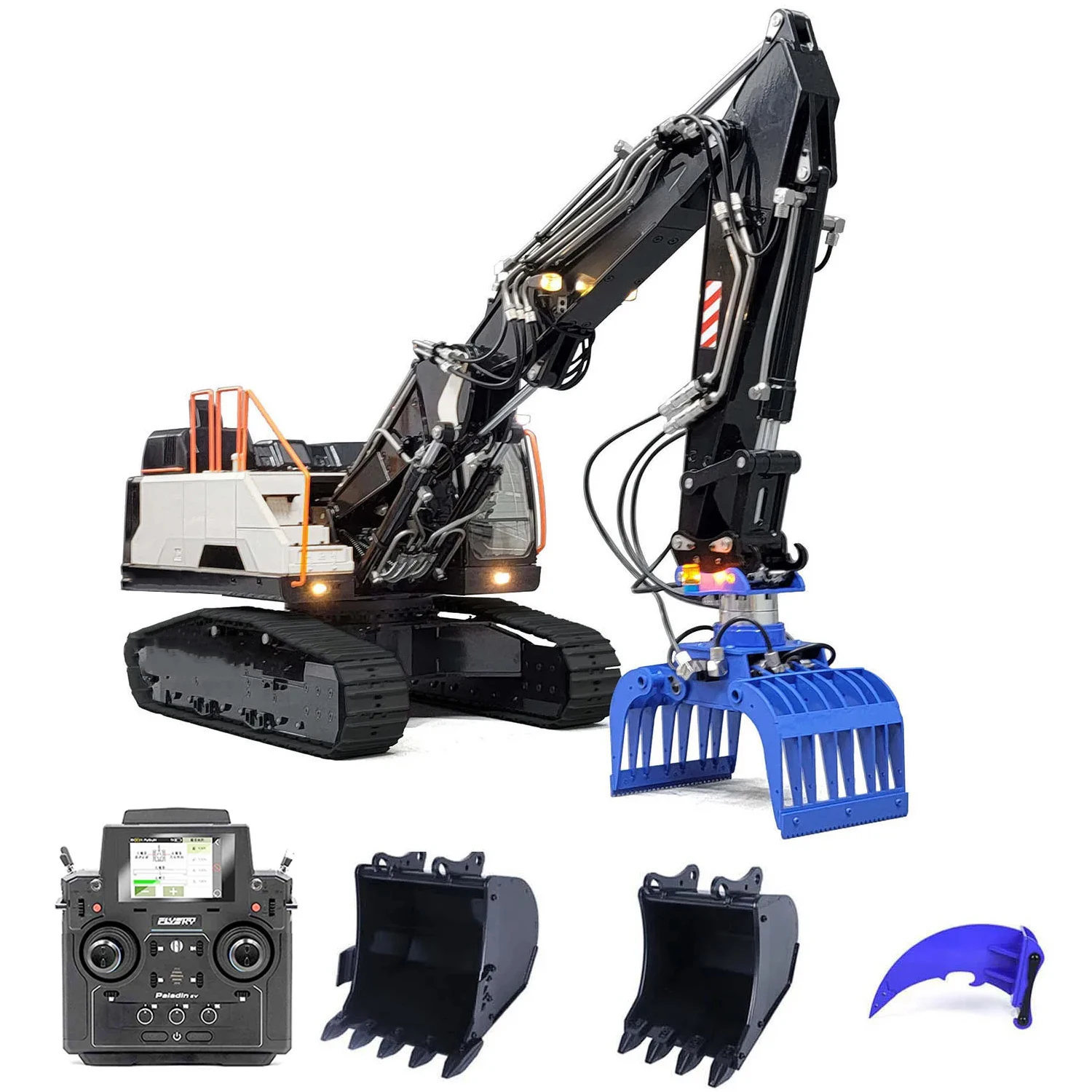How to Maintain Your rc excavator for Longevity and Optimal Performance
Discover the Value of Excavator in Modern Building And Construction Projects
Excavators are essential devices in modern building jobs. Their convenience permits them to perform a vast array of jobs, from excavating and grading to demolition and site preparation. Advanced features, such as hydraulic attachments and GPS, boost their abilities and effectiveness on task sites. As the market progresses, the significance of excavators grows much more. Recognizing their role can expose understandings right into the future of construction practices. What lies ahead for these devices?
The Convenience of Excavators in Different Projects
Although excavators are commonly connected with large building and construction jobs, their versatility enables them to be utilized in a variety of applications, from domestic landscaping to energy upkeep. In city setups, excavators can navigate tight spaces to dig structures for homes or mount drainage systems. Their ability to carry out fragile jobs makes them perfect for landscaping jobs, where they can excavate for ponds or plant trees. Additionally, excavators play a necessary role in energy upkeep, effectively excavating trenches for pipes or wires without interrupting surrounding areas. In agricultural applications, they assist in land cleaning and soil prep work. Moreover, their adaptability enables them to be furnished with various add-ons, boosting their functionality throughout different jobs. This diverse nature of excavators not only simplifies different building and construction procedures but additionally shows their essential role in modern-day framework advancement and upkeep.
Key Functions and Sorts Of Excavators
The discussion on vital features and kinds of excavators highlights the vital qualities that make these makers vital in building and construction. Numerous excavator kinds, each designed for particular tasks, show their flexibility and effectiveness throughout various applications. rc excavator. Comprehending these features and categories is important for maximizing their use in modern-day construction tasks
Excavator Keys In Introduction
Excavators play an essential function in modern-day construction, using flexibility and effectiveness across different jobs. These hefty equipment units can be found in a number of kinds, each tailored for certain applications. One of the most common types include spider excavators, known for their security on unequal surface, and wheeled excavators, which provide better wheelchair on smooth surface areas. Miniature excavators are favored for tight spaces and small-scale tasks, while long-reach excavators are created for deep excavating. Furthermore, there are specialized excavators, such as hydraulic excavators, which boost power and accuracy. Each kind features unique abilities, making them necessary for jobs ranging from digging and grading to demolition and material handling. Recognizing these variations enables construction professionals to select the ideal excavator for their job needs.
Trick Includes Explained
Recognizing the vital features of excavators boosts their reliable application in construction tasks. Excavators are characterized by their powerful hydraulic systems, which provide the necessary force for digging, lifting, and relocating materials. Their expressed arms enable a large range of movement, helping with precise procedures in confined spaces. In addition, the selection of accessories, such as buckets, grapples, and augers, expands their versatility to fulfill different project requirements. The size and weight of excavators also add to their stability and ability to move on numerous surfaces. Developments in technology have actually led to the assimilation of GPS and automation, boosting accuracy and effectiveness in excavation jobs. These functions jointly position excavators as vital devices in modern building and construction.
Applications in Building and construction
Transforming building websites, excavators play a crucial function throughout various applications, varying from property building tasks to large-scale infrastructure advancements. These flexible equipments are geared up for tasks such as excavating structures, trenching for utilities, and site grading. Various kinds of excavators, consisting of spider, wheeled, and mini excavators, give specific benefits tailored to the project demands. Spider excavators master rough surfaces, while wheeled excavators offer flexibility on smooth surfaces. Tiny excavators are optimal for confined areas, making them prominent in metropolitan setups. The efficiency and power of excavators considerably speed up construction procedures, making sure prompt task conclusion. Their versatility additionally improves their significance, permitting construction groups to tackle a varied array of obstacles efficiently.
Enhancing Efficiency and Productivity on Job Sites
Taking full advantage of efficiency and efficiency on task sites is an important objective in modern-day construction. Excavators play a crucial duty in achieving this goal by streamlining various jobs. Their capacity to execute several features-- such as lifting, grading, and excavating-- minimizes the demand for added devices, thus conserving time and resources.Moreover, excavators enhance workflow by permitting faster completion of projects. With innovative attributes like hydraulic attachments and general practitioners technology, they can implement specific operations that minimize mistakes and rework. This accuracy not just enhances the quality of job yet also enhances material usage, adding to set you back savings.The adaptability of excavators enables them to adjust to various website conditions, making certain that jobs progress efficiently regardless of challenges. By integrating excavators into construction processes, groups can considerably boost their general productivity, bring about timely job completion and raised earnings.
Safety And Security Benefits of Utilizing Excavators
Excavators greatly improve safety and security on construction sites with boosted operator presence and decreased manual work threats. By offering drivers with a clear sight of their environments, excavators help to prevent injuries and crashes. Additionally, the machinery decreases the need for employees to involve in unsafe hands-on jobs, additionally advertising a much safer job setting.
Boosted Driver Presence
Building and construction websites can be chaotic and filled up with possible hazards, enhanced driver exposure plays a vital duty in making sure safety when utilizing excavators. Modern excavators are designed with big, unblocked home windows and purposefully positioned mirrors, permitting operators to maintain a clear view of their environments (rc excavator). This improved visibility is vital for identifying pedestrians, other equipment, and numerous challenges, substantially reducing the risk of mishaps. Additionally, several excavators integrate advanced modern technology, such as sensing units and cameras, to offer drivers with added point of views, even more boosting understanding. The capability to see even more plainly not only help in effective procedure however additionally fosters a safer workplace, making it simpler for drivers to browse complicated building and construction websites without compromising security criteria
Reduced Guidebook Labor Risks
When hands-on labor is decreased through using excavators, various safety advantages arise, significantly improving the health of construction employees. Excavators lessen the physical pressure linked with hefty lifting and repetitive tasks, successfully decreasing the danger of musculoskeletal injuries. By automating processes such as digging, grading, and moving materials, they permit workers to preserve a safer distance from possible dangers. Additionally, excavators are outfitted with innovative safety and security features, such as rollover security systems and improved operator comfort designs, which further protect workers on website. The outcome is a considerable decrease in workplace accidents and injuries, resulting in enhanced productivity and morale among building groups. Eventually, the fostering of excavators adds to a more secure and a lot more effective building and construction atmosphere.
Excavators in Earthmoving and Site Preparation
In contemporary construction, a significant portion of earthmoving and site prep work jobs depends on the efficiency and flexibility of excavators. These equipments are made to deal with various dirt types and terrain, making them crucial for grading, digging, and trenching activities. Their hydraulic arms can be outfitted with different accessories, such as pails and augers, allowing drivers to tailor their approach based upon specific project requirements.Excavators succeed at moving big quantities of planet swiftly and efficiently, which increases the general construction timeline. They can browse tight areas and testing websites where typical devices might have a hard time, enhancing performance. Furthermore, the accuracy of excavators assurances that website prep work abides by rigorous specifications, decreasing the risk of mistakes that might result in expensive rework.
The Function of Excavators in Demolition Tasks
Excavators play an essential function in demolition tasks, as they possess the view power and agility required to take down structures efficiently. Furnished with numerous attachments such as hydraulic breakers, shears, and grapples, these makers can adjust to various demolition demands, whether for small buildings or large commercial sites. Their adaptability makes it possible for operators to deal with intricate tasks while preserving security and precision.In enhancement to their demolition capacities, excavators assist in debris removal, ensuring that work sites remain well organized and risk-free. By breaking down structures right into convenient items, they permit structured cleaning and recycling of materials, lining up with modern sustainability efforts.Moreover, excavators can access tight spaces and navigate uneven surface, making them essential in urban demolition projects. Generally, their durable layout and multifunctionality make excavators a vital asset in the demolition phase of construction, adding considerably to project timelines and efficiency.


Future Trends in Excavator Technology and Usage
As the construction sector advances, developments in excavator innovation are poised to transform their use and effectiveness markedly. One significant fad is the integration of automation and artificial intelligence, permitting excavators to operate with marginal human treatment. This change will certainly enhance precision in jobs such as grading and trenching, lowering human error and increasing productivity.Additionally, the increase of hybrid and electric excavators is forming a more lasting building and construction atmosphere, reducing carbon discharges and fuel expenses. Improved telematics systems are likewise arising, allowing real-time surveillance of device performance and upkeep demands, which can cause better functional efficiency and longer devices lifespan.Moreover, developments in go add-on technology are broadening the versatility of excavators, permitting them to execute a broader variety of jobs. The mix of these patterns shows a future where excavators are smarter, greener, and much more adaptable, eventually reshaping building project characteristics.
Often Asked Questions
Just How Do Excavators Contrast to Various Other Building And Construction Machinery?
Excavators, identified by their adaptability and power, master excavating and earthmoving compared to various other machinery. Their capacity to execute different tasks, consisting of lifting and demolition, makes them essential in building and construction jobs, enhancing general performance.

What Is the Typical Life-span of an Excavator?
The typical life-span of an excavator typically varies from 7,000 to 10,000 operating hours, depending upon maintenance, use problems, and model. Appropriate treatment can extend this life-span, making sure peak efficiency throughout its functional years.
How Are Excavators Preserved for Ideal Efficiency?
Excavators require regular upkeep for peak efficiency, including regular evaluations, liquid checks, filter replacements, and timely repair work. Executing a precautionary maintenance timetable helps lengthen their lifespan and assurances reliable procedure in different building and construction atmospheres.
What Are the Costs Related To Leasing vs. Acquiring an Excavator?
The prices connected with buying an excavator versus leasing vary substantially. Leasing offers lower upfront expenses yet can accumulate over time, while purchasing needs a significant first financial investment, yet offers long-lasting financial savings and asset ownership advantages.
What Training Is Called For to Operate an Excavator?
Running an excavator calls for specialized training, typically including safety and security procedures, device operation techniques, and environmental awareness. Certification programs often mandate useful experience, making it possible for drivers to manage various tasks efficiently while making certain compliance with industry laws. The most typical types consist of spider excavators, recognized for their stability on unequal terrain, and rolled excavators, which provide better wheelchair on smooth surface areas. Small excavators are preferred for limited spaces and small-scale jobs, while long-reach excavators are created for deep digging. In addition, there are specialized excavators, such as hydraulic excavators, which improve power and precision. Different kinds of excavators, consisting of spider, rolled, and mini excavators, supply specific benefits customized to the This Site task demands. Crawler excavators excel in rough surfaces, while rolled excavators offer wheelchair on smooth surface areas.